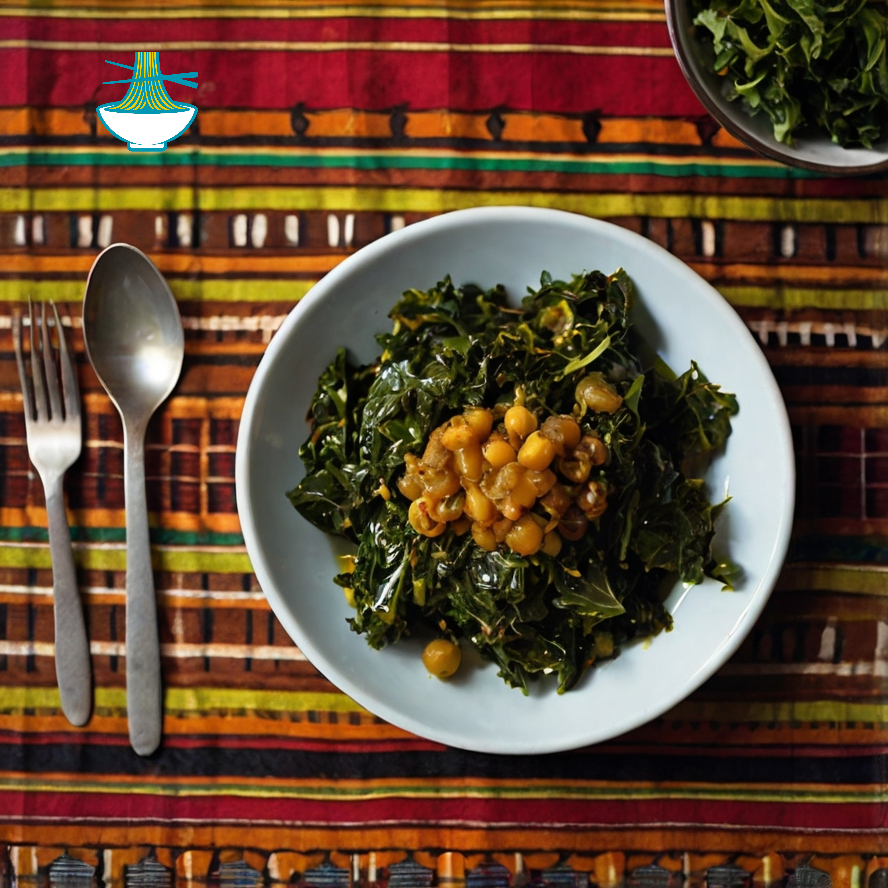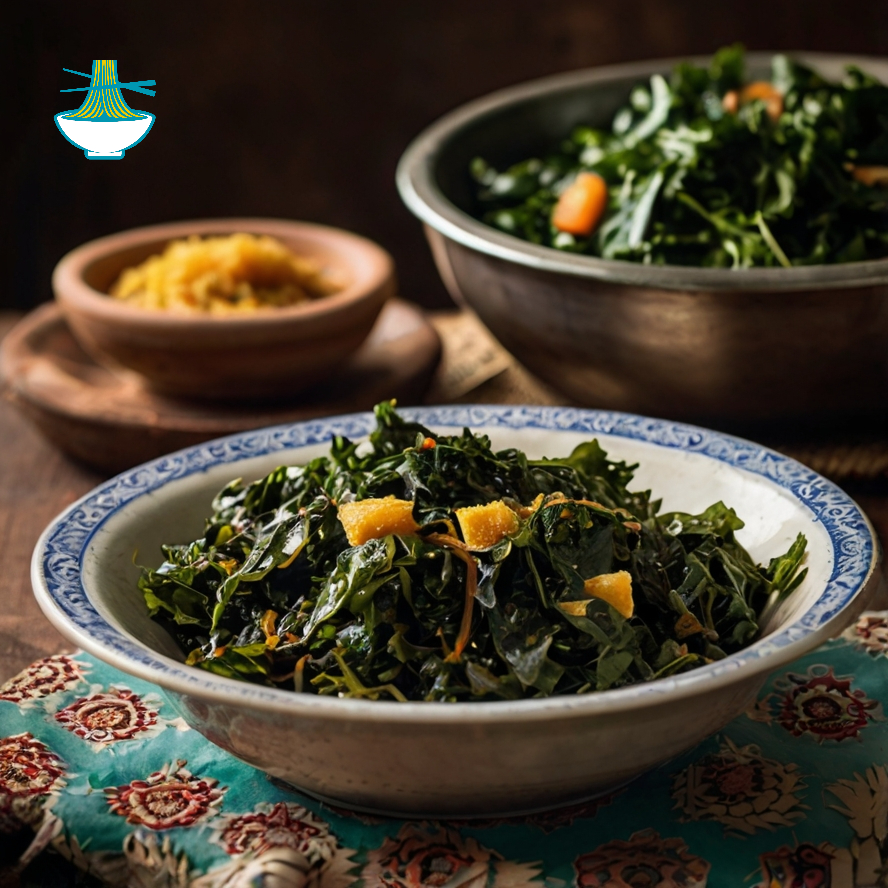Indulge in the flavors of Kenya with this traditional dish of Sukuma Wiki with Mrenda. Sukuma Wiki, meaning "stretch the week," is a popular East African dish made from collard greens. In this recipe, we add a twist by incorporating Mrenda, also known as Jute mallow, for an extra dose of flavor and nutrition. The greens are cooked with onions, tomatoes, and a blend of spices, creating a hearty and wholesome meal that's perfect for any day of the week.
Here's a recipe for Kenya Sukuma Wiki with Mrenda:
Ingredients:
- 1 bunch sukuma wiki (collard greens), chopped
- 1 bunch mrenda (Jute mallow), chopped
- 2 tablespoons vegetable oil
- 1 onion, finely chopped
- 2 tomatoes, chopped
- 2 cloves garlic, minced
- 1 teaspoon ginger, minced
- 1 teaspoon curry powder
- Salt and pepper to taste
Instructions:
1- Heat the vegetable oil in a large pan over medium heat.
2- Add the onions and cook until translucent, about 3-4 minutes.
3- Stir in the garlic, ginger, and curry powder, and cook for another minute.
4- Add the tomatoes and cook until they begin to soften, about 5 minutes.
5- Stir in the sukuma wiki and mrenda, and season with salt and pepper.
6- Cover the pan and let the greens cook down, stirring occasionally, for about 10-15 minutes, or until they are tender.
7- Serve hot as a side dish with ugali (cornmeal) or rice.
Enjoy your Kenyan Sukuma Wiki with Mrenda!
Nutritional Values:
Here are the approximate nutritional values for the ingredients in the Kenya Sukuma Wiki with Mrenda recipe per serving:
1 Bunch Sukuma Wiki (Collard Greens), Chopped:
- Calories: 70 kcal
- Fat: 1 g
- Carbohydrates: 13 g
- Protein: 7 g
Benefits: Collard greens are rich in vitamins A, C, and K, calcium, and fiber. They support bone health, boost the immune system, and have antioxidant properties. The high fiber content aids digestion and helps maintain a healthy weight.
1 Bunch Mrenda (Jute Mallow), Chopped:
- Calories: 35 kcal
- Fat: 0.5 g
- Carbohydrates: 7 g
- Protein: 3 g
Benefits: Mrenda provides essential vitamins and minerals like calcium, iron, and vitamins A and C. Known for its mucilaginous texture, it is beneficial for digestion. Mrenda also has anti-inflammatory and antioxidant properties, supporting overall health.
2 Tablespoons Vegetable Oil:
- Calories: 240 kcal
- Fat: 27 g
- Carbohydrates: 0 g
- Protein: 0 g
Benefits: Provides essential fatty acids and helps in the absorption of fat-soluble vitamins. It also helps in cooking the vegetables, adding richness and flavor to the dish.
1 Onion, Finely Chopped:
- Calories: 45 kcal
- Fat: 0 g
- Carbohydrates: 11 g
- Protein: 1 g
Benefits: Onions are rich in antioxidants and compounds that support heart health, reduce inflammation, and may help regulate blood sugar levels. They add depth of flavor and aroma to the dish.
2 Tomatoes, Chopped:
- Calories: 44 kcal
- Fat: 0 g
- Carbohydrates: 10 g
- Protein: 2 g
Benefits: Tomatoes are a great source of vitamin C, potassium, folate, and lycopene, a powerful antioxidant that supports heart health and may reduce the risk of certain cancers. They add acidity and natural sweetness to the dish.
2 Cloves Garlic, Minced:
- Calories: 8 kcal
- Fat: 0 g
- Carbohydrates: 2 g
- Protein: 0.4 g
Benefits: Garlic has potent anti-inflammatory, antioxidant, and antimicrobial properties. It supports heart health, boosts the immune system, and adds a strong, savory flavor to the dish.
1 Teaspoon Ginger, Minced:
- Calories: 2 kcal
- Fat: 0 g
- Carbohydrates: 0.5 g
- Protein: 0.1 g
Benefits: Ginger is known for its anti-inflammatory and digestive benefits. It can help reduce nausea, improve digestion, and adds a warm, spicy flavor to the dish.
1 Teaspoon Curry Powder:
- Calories: 6 kcal
- Fat: 0.3 g
- Carbohydrates: 1.1 g
- Protein: 0.2 g
Benefits: Curry powder is a blend of spices like turmeric, coriander, cumin, and chili, which have antioxidant, anti-inflammatory, and digestive benefits. It adds a warm, complex flavor to the dish.
Salt and Pepper to Taste:
- Calories: Negligible
- Fat: 0 g
- Carbohydrates: 0 g
- Protein: 0 g
Benefits: Salt enhances the flavor of the dish, while black pepper contains antioxidants and may aid digestion.
Please note that these values are approximate and can vary based on factors such as the specific brands of ingredients used and cooking methods.


Comments